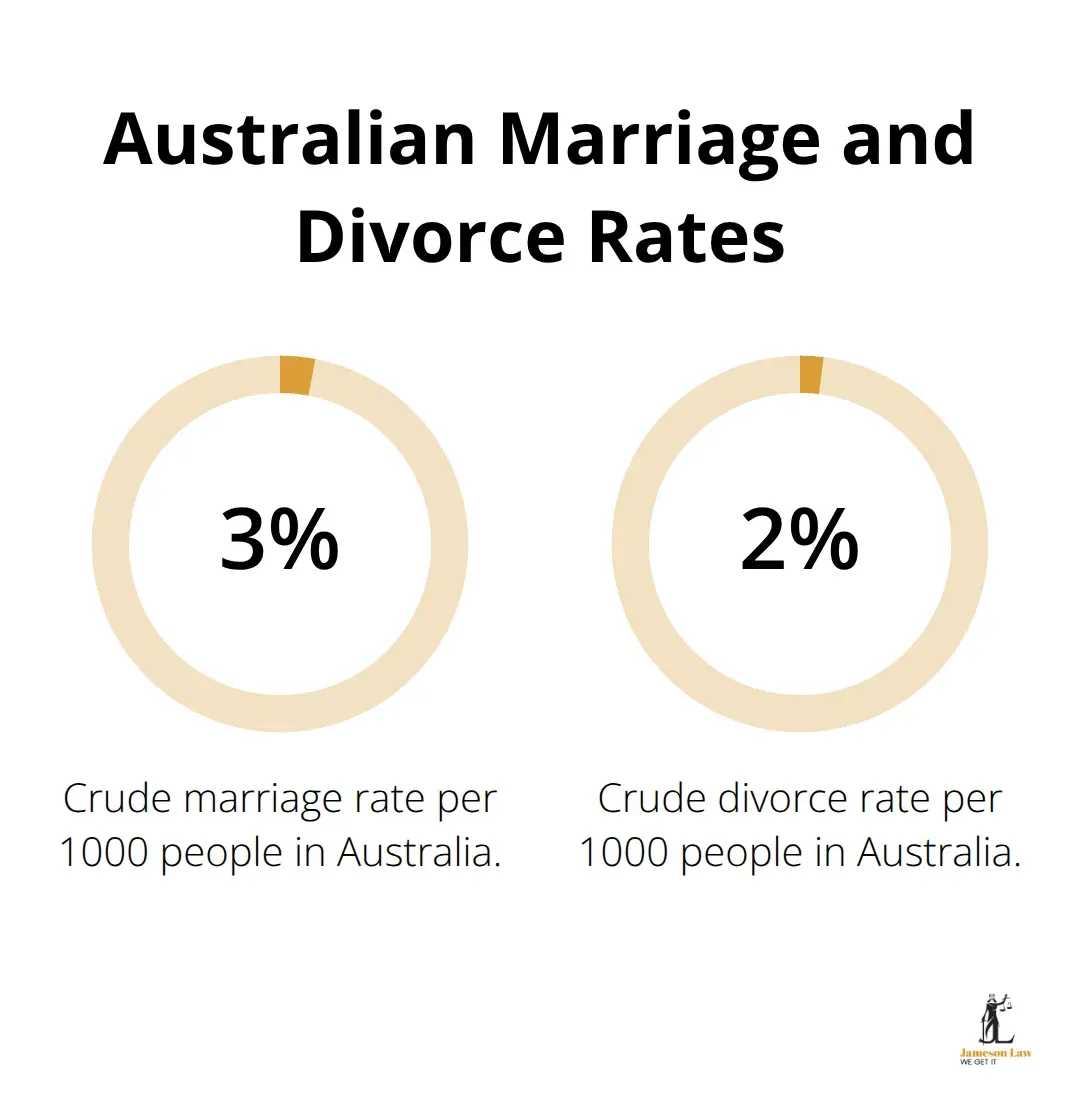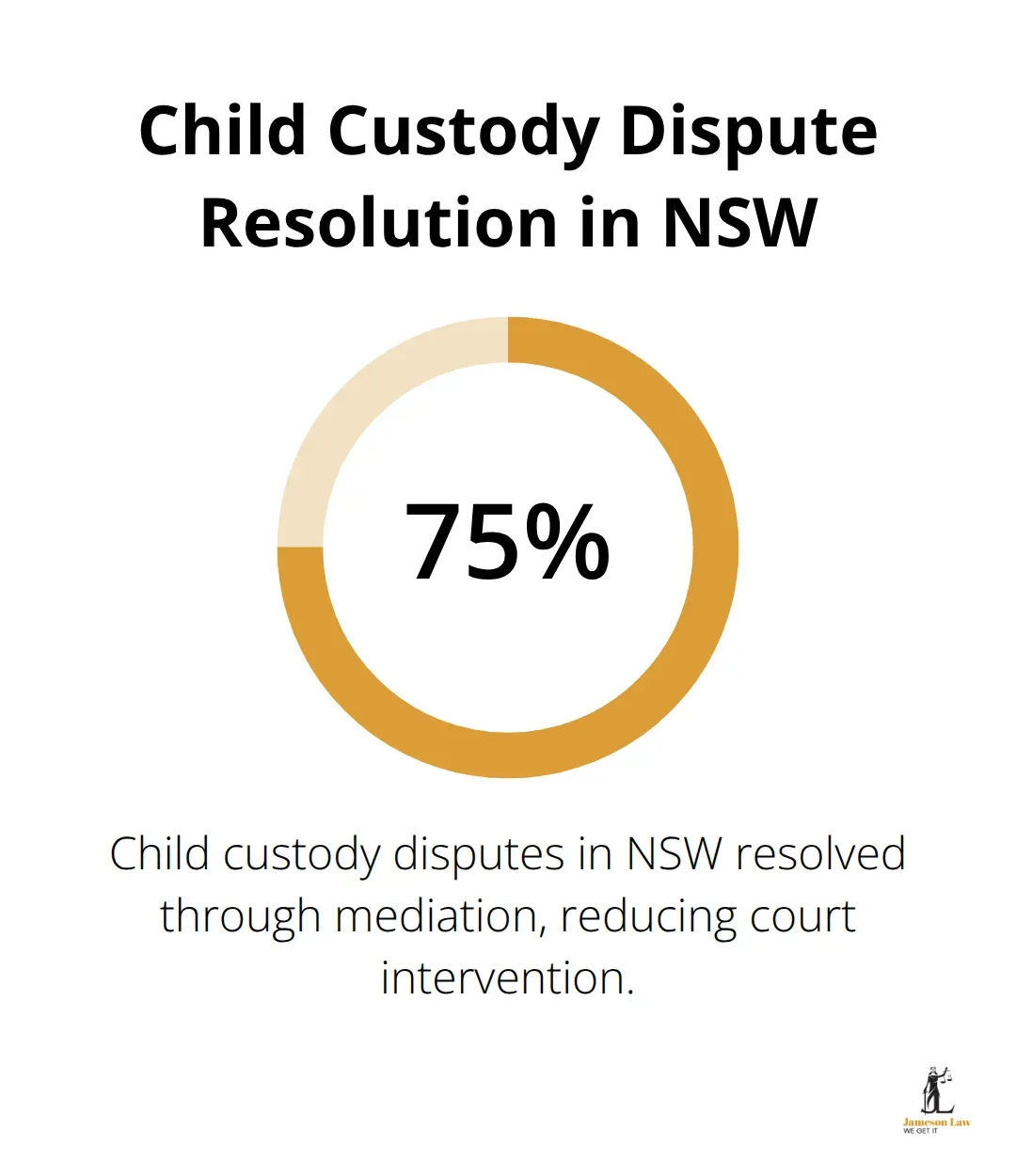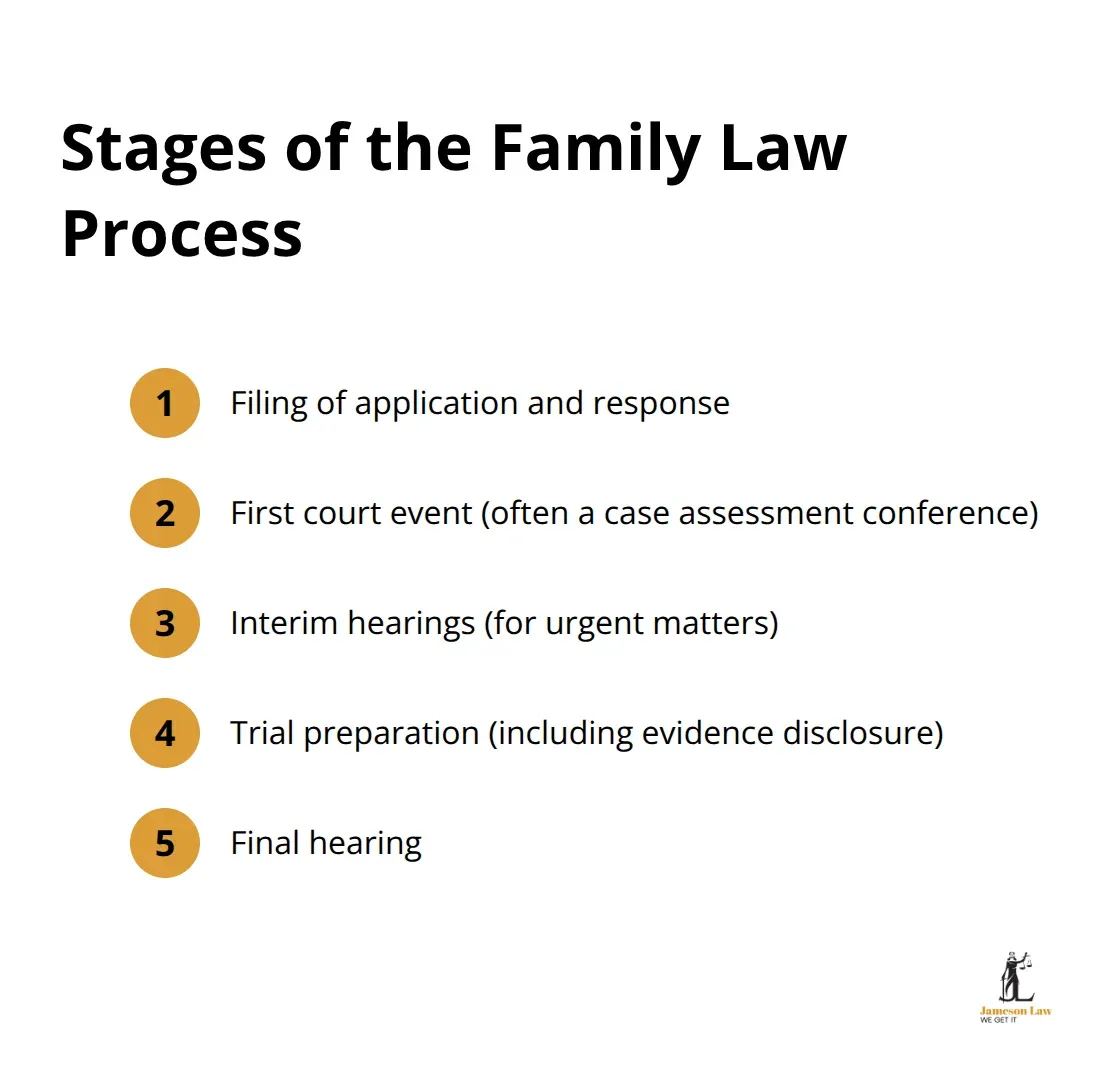Family law matters can be complex and emotionally challenging. At Jameson Law, we’ve created this comprehensive Family Law Handbook to guide you through essential legal aspects in New South Wales.
Our handbook covers key topics such as divorce, child custody, property settlement, and domestic violence orders. We walk you through the family law process, from initial consultations to consent orders and court proceedings, and explain your rights and responsibilities along the way.
Common Family Law Cases in NSW
Family law encompasses a wide range of legal matters that affect families and relationships. In New South Wales, several types of family law cases occur frequently. Understanding these common cases can help you navigate your own situation more effectively.
Divorce and Separation
Divorce and separation are among the most frequent family law cases. In Australia, the divorce process generally requires a 12-month separation period before filing. “Separation under one roof” is possible where appropriate evidence is provided. See the court’s guidance on divorce and separation under one roof.
For national trends, review ABS Marriages and Divorces. When you consider divorce, gather all relevant financial documents, review living arrangements, and plan communication with your ex-partner, especially where children are involved.

Child Custody and Parenting Arrangements
Parenting disputes are often the most emotionally charged. Australian family law focuses on the best interests of the child, not parental rights. Start with a practical parenting orders framework and consider Family Relationships Online for helpful resources.
When you develop a parenting plan, consider age, schooling, extracurricular activities and logistics. Flexibility and a child-centred approach are crucial. For support services, see Relationships Australia NSW.
Property Settlement
Property settlement involves dividing assets and liabilities after separation. There is no fixed formula — outcomes depend on disclosure, valuations, contributions and future needs. Read the court’s overview of property and finance and our step-by-step guide to property settlements. Budgeting help is available via Moneysmart.
Prepare a comprehensive schedule of assets and debts, including superannuation. Provide full and frank disclosure, supported by bank statements, valuations and tax returns.
Domestic Violence and Intervention Orders
Domestic and family violence matters are treated seriously. In NSW, ADVOs provide legal protection. If you are in immediate danger call 000. For confidential counselling and referral, contact 1800RESPECT.
For ongoing protection, consider applying for an ADVO and keep detailed records of incidents, including dates and messages. Read our guides on domestic violence and AVOs in NSW.
Family law cases can challenge you emotionally and legally. Expert guidance can help you navigate these complex situations. With the right support, you can work towards resolution and move forward. The next section outlines the family law process in NSW.
Navigating the Family Law Process in NSW
The family law process in NSW can be demanding. Understanding each step will help you navigate more effectively. This chapter outlines key stages and practical tips.
Initial Consultation and Case Assessment
Your family law journey typically starts with an initial consultation. This meeting lets you discuss your situation and receive an early assessment. To make the most of it:
- Bring relevant documents (financial records, communications, any orders)
- Be clear about goals and concerns
- Expect initial strategy options and likely pathways
Find qualified practitioners via the Law Society of NSW Accredited Specialists search.
Mediation and Dispute Resolution
Mediation (Family Dispute Resolution) is required in most parenting matters before litigation. A neutral mediator helps parties identify issues and explore agreement. Learn more at FDR – FCFCOA and Family Relationships Online – Find a service. We also offer family law mediation in Sydney.

Preparation helps: prioritise issues, be open to compromise, and focus on workable, child-centred solutions.
Court Proceedings and Hearings
If matters do not resolve, your case may proceed to court. Typical stages include:
- Filing an application and response
- First court event or case assessment conference
- Interim hearings for urgent or procedural issues
- Trial preparation including disclosure and evidence
- Final hearing

Timeframes vary with complexity and listing availability. Review the court’s case management pathway. During proceedings, follow directions and deadlines strictly to avoid adverse costs or delays.
Enforcement of Orders
Orders made by consent or after hearing are legally binding. If non-compliance occurs, enforcement options depend on the order type:
- For financial orders: consider enforcement applications, redirection or seizure
- For parenting orders: seek make-up time or variation where appropriate
See the court’s pages on contravention of parenting orders and enforcement of financial orders. The Family Law Act 1975 – key points outlines penalties for non-compliance, though courts prefer practical solutions that encourage compliance.
As you move through these stages, experienced guidance can shape outcomes. The next chapter covers your core rights and responsibilities.
Legal Rights and Duties in Family Law
Family law involves a network of rights and responsibilities. Understanding these helps protect your interests and supports informed decision-making.
Parental Rights and Obligations
Both parents share responsibilities for their children regardless of marital status. Major decisions about health, education and welfare should be made in a child’s best interests. See the court’s overview of parenting and our guide to parenting orders explained.
Parents must also provide financial support. Use the Child Support Estimator and read our child support agreements guide.
Financial Disclosure Requirements
Full and frank disclosure is a cornerstone of family proceedings. Provide a complete picture of assets, liabilities and income. The court’s financial questionnaire and duty of disclosure pages outline expectations.
To comply:
- Collect bank statements, tax returns and superannuation records
- Disclose all assets, including trusts and interests
- Be accurate about all sources of income
Child Support and Spousal Maintenance
Parenting arrangements interact with child support, which is administered by Services Australia. For private agreements, consider consent orders for enforceability.
Spousal maintenance is not automatic. You must show need and capacity to pay. Learn about eligibility and time limits in our spousal maintenance guide and see the court’s maintenance applications.
Asset Protection During Separation
Protecting assets is important. You cannot hide or dissipate property, but you can take lawful steps to safeguard your position. Consider Binding Financial Agreements, interim undertakings, and where necessary, injunctions. The court can restrain dealings with property; see injunctions.
Good practice includes documenting asset values at separation, maintaining records and managing joint accounts responsibly.
Final Thoughts
Family law matters challenge individuals emotionally and legally. This Family Law Handbook provides essential information, but professional expertise often proves necessary for the best outcomes. We at Jameson Law understand the complexities and their impact on your life.
Our experienced team offers tailored support across divorce, property settlements, parenting arrangements, spousal maintenance and mediation. For confidential help in Sydney, call (02) 8806 0866 or contact us today.













